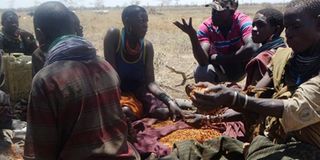Food insecurity to worsen in Karamoja - new study

Karamojong women sort soya beans. Food insecurity to worsen in Karamoja, a new study has warned
What you need to know:
- The WFP country director, Mr El Khidir Daloum said WFP hopes that the findings and recommendations of the study will contribute to efforts towards appropriate adaption measures while helping to identify policies that will safeguard the most vulnerable communities in Karamoja.
- The study recommends that government and its partners increase investments in water harvesting and agroforestry schemes, education of the people, improved access to climate change information and the cultivation of drought-resistant crop varieties.
Kampala. A new study on the impact of climate change to food security in Karamoja has predicted hard times for the region as millions face starvation in Uganda.
The study titled: “The Impacts of climate change on food security and livelihoods in Karamoja sub-region” is an outcome of a four and a half months study carried out last year by the ministry of Water and Environment and World Food Programme (WFP), among other partners. the study was sponsored by the Swedish government.
The report warns that Karamoja sub-region may be plunged into the worst food insecurity if government does not take measures towards climate change in the region.
This comes barely a month after the 2016 Integrated Food Security Phase Classification (IPC) analysis report, which was released last month, revealed that the sub-region could face a humanitarian emergency due to widespread food shortages, with an expected 390,165 people starving.
While releasing the report, the WFP head of the Analysis, Monitoring & Evaluation unit, Mr Siddhartha Krishnaswany said: “The report shows rising temperatures threatening to increase the frequency, intensity and the duration of heat waves in the region therefore reducing availability of water for crops and animals.
The commissioner of climate change in the ministry of Water and Environment, Mr Chebet Maikut, said: “...while the dry season has been a normal annual occurrence in the region, there are some particular cases of unprecedented early or late onset/absence of the rains.” He said the country should build resilient communities and ecosystems through restoration of wetlands and associated water catchments to resist climate change impact.
The Minister of Water and Environment, Mr Sam Cheptoris, said the ministry was already calling for national and regional response, advocating for climate change sensitive approaches across all government sectors, educating the population about climate change and undertaking emissions profiles.
The WFP country director, Mr El Khidir Daloum said WFP hopes that the findings and recommendations of the study will contribute to efforts towards appropriate adaption measures while helping to identify policies that will safeguard the most vulnerable communities in Karamoja.
Recommendations
The study recommends that government and its partners increase investments in water harvesting and agroforestry schemes, education of the people, improved access to climate change information and the cultivation of drought-resistant crop varieties.




